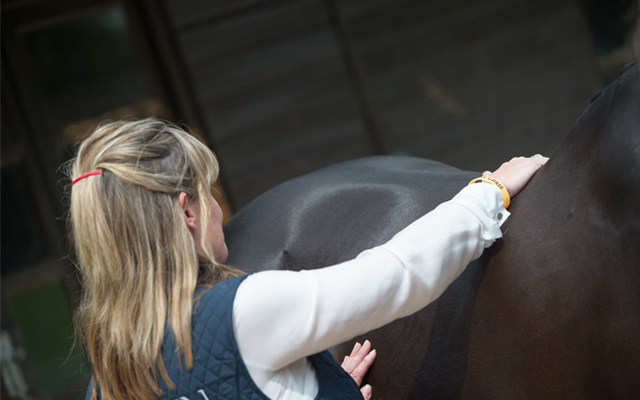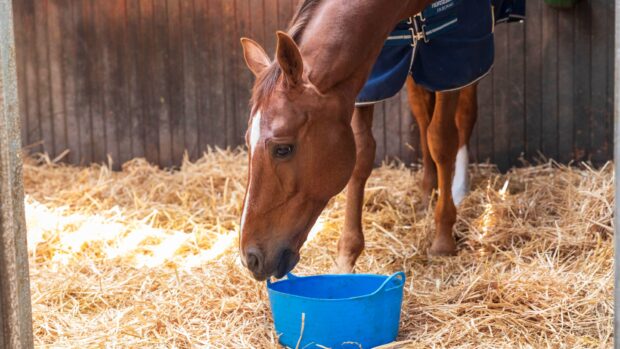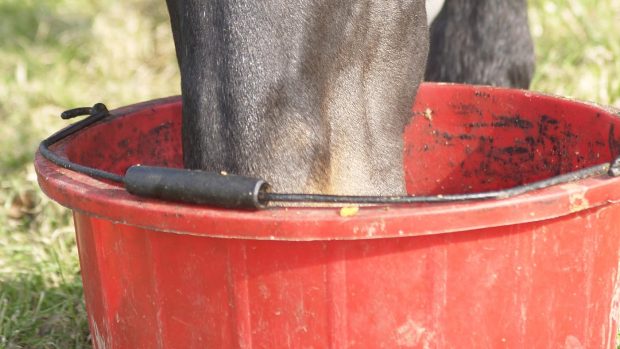Feeding a good doer can be a real challenge. One day he's looking great, then seemingly overnight, he turns into a chubby Thelwell pony. How did that happen? It could be due to one of the following reasons...
1. You’re feeding too much for his workload
Calorie-counting is the same with horses as it is with humans — if they take in more calories than they burn off, they’ll put on weight. A 500 kilo horse in hard work will burn nearly twice as many calories a day as his mate who weighs the same, but is ridden lightly twice a week — 34,500 calories as opposed to 20,000, according to Dengie equine nutritionist Tracey Hammond. You need to make sure your horse is receiving the right amount of feed for his weight and workload and no more, or he’ll gain weight. Most of the feed companies contain detailed information about this on their websites.
2. You’re feeding incorrectly for his breed
Native breeds have evolved to be good doers, making the most of poor quality grazing. “Natives generally require feeds of a lower calorie level as they maintain their weight easily, but they still need lots of fibre to maintain digestive and behavioural health,” says Dengie’s Tracey Hammond.
“Starving them is definitely not what needs to happen — we just need to feed lower calorie fibre sources. While native types don’t tend to require additional concentrate feeds to provide calories, what they do need is a balanced diet,” she adds.
“UK pasture can easily exceed energy requirements of most horses at rest or in light work, but it doesn’t supply everything that they need in that it tends to lack trace minerals, for example copper, zinc and selenium. If they are on a hay only diet, this can also extend to a lack of vitamins and good quality protein as well. So for native types that hold their weight well, a feed balancer or vitamin and mineral supplement with a small amount of low calorie fibre feed is really all they need in addition to grazing and hay.”
Continued below…
We talk you through the dos and don'ts of feeding the performance horse for optimum condition with the help of

H&H Feed Week: 6 things to remember when feeding your competition horse
3. You’re feeding incorrectly for his age
Feeding young horses correctly is important to ensure they grow at an appropriate rate. “The most important thing when feeding youngstock additional calories is that we ensure that the diet is completely balanced at all times,” says Briony Mitchell, equine nutritionist with Bailey. “The majority of growth and development problems occur when there is too much energy/calories going into the diet and not sufficient levels of vitamins, minerals and quality protein. Ideally you would want to keep youngsters in relatively light condition (4-4.5 out of 9) as this reduces the amount of pressure and strain on growing joints and limbs.”
Equally, once your horse starts to age, you may find he needs more calories to maintain his condition as his ability to chew hard feed may be impared by dental issues. Also the digestive system of the older horse tends to be less efficient at processing feed. However, not all horses need a ‘veteran’ mix, so monitor their condition and speak to a nutritionist if you need advice on what best to feed your older horse.
4. You’re feeding too much for the time of year
In spring and summer, grass is richer; in winter, it’s poorer and sparser. According to Allen & Page, in winter, your horse will use up to 80% of his feed energy to keep warm, and his weight may drop accordingly. However, most horse owners prefer their horses to maintain a steady weight throughout the year. Condition score your horse regularly so you know whether he needs more or less feed, as the level required will fluctuate with the seasons.
5. You don’t know what he weighs
Horses in light/medium work need to consume 2% of their body weight in mainly forage (70-100% of their food intake) a day, says Tracey Hammond — and if you don’t know how much he weighs, how do you know if he’s getting that, too much, or too little? Invest in a good weigh tape or take advantage of the weigh bridge services that some feed companies offer.
6. You’re not weighing his feed
If you have a horse that’s prone to piling on the pounds, it’s not good enough just to fling some feed into a bucket and hope for the best. You need to be strict with him — and yourself — and weigh his feed. As a rule (as stated above) a 500 kilo horse needs 20,000 calories a day in order to maintain his weight. There are approximately 7-8 MJ (or 2,000 calories) in a kilo of good quality hay according to Tracey Hammond, so if you’re stuffing his haynet with 10 kilos of hay each night, he’s already receiving all the calories he needs just for maintenance — and that’s before you include any grass or hard feed. If you’re worried about him scoffing his hay ration in under an hour and standing with an empty net for the rest of the night, then invest in a trickle net tto encourage him to eat more slowly.
7. You’re feeding too much hard feed
According to Dengie, research conducted in recent years suggests that many diseases including laminitis, colic, gastric ulcers, Developmental Orthopaedic Disease (DOD), Equine Rhabdomyolysis Sydrome (ERS) and Polysaccharide Storage Myopathy (PSSM) are linked to high starch diets, which is why a “fibre revolution” has begun. Many feed companies now offer fibre-based feeds among their products.
8. All hard feeds are not created equal
Once you’ve worked out how many calories your horse needs for his weight, breed, age and level of work, then check the calorie intake he’ll receive from his hard feed as the different types and brands vary enormously.
9. Your grass is too good
Grass can contain a lot of sugar and calories, particularly in summer. You may need to reduce or cut out hard feed altogether to take this into account. If you do decide to cut back on your horse’s hard feed ration, consider feeding a balancer or all-round vitamin and mineral supplement instead to ensure your horse still gets all he needs to remain healthy.
10. You’re buying the wrong hay
“If you have a good doer, you need to choose the most suitable forage possible — a late cut, coarser hay/haylage will typically be less nutritious than an early cut forage,” says Briony Mitchell. “In addition to this, or if you can’t find a more suitable forage, you can soak the hay for 14-16 hours to leach some of the goodness.”
11. You’re trying to starve him into being skinny
Horses can’t do ‘crash diets’ any more than humans can. In fact, they’re designed to trickle feed, which means they need an almost constant supply of forage for their digestive system to work correctly, says Briony Mitchell. If you withhold food from them, they may develop ulcers, and may also gorge quickly on food when presented with it. Any dietary changes need to be introduced gradually and over a significant period of time to be effective.
12. He’s a good doer
Some horses just seem to get fat on thin air. If your horse seems to be putting on weight despite taking all the precautions above, then speak to your vet, as he may need to have a special feeding programme devised for him. Being a good doer can also present a problem in competition horses, as feeding them for their level of activity can provide too many calories and cause them to gain weight. One solution is to feed less hard feed and a good balancer instead, suggests Briony Mitchell.




